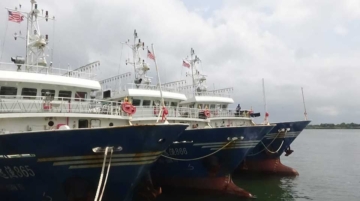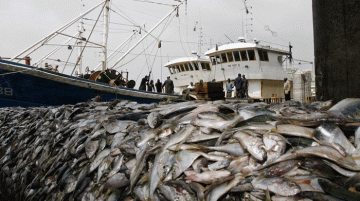
The South China Sea punches well above its size in terms of marine biodiversity. The semi-enclosed sea, which spans over three million kilometers, is home to 8,600 different types of marine plants and animals including tuna and mackerel, grouper, herring, and crab, and seven out of nine global giant clam species.
Although the South China Sea is about 17% smaller compared to the adjacent Coral Triangle, there are about 571 different known species of coral in its waters, which is close to the nearly 600 found in the waters of its more high-profile neighbor.
But those numbers only tell part of the story. Statistics reveal the rich marine resource has been grossly exploited and mismanaged over decades. Overfishing has caused fish stocks to plummet by up to 90% since the 1950s. Catch rates – the number of fish caught per trip – have dropped by 75% over the last two decades. Thanks to activities like dredging and commercial clam harvesting, more than 160 square kilometers of coral reefs have been destroyed.
Once Bountiful Fish Stocks at Risk of Disappearing
Late last year, a group of scientists from China, Malaysia, Indonesia, the Philippines, and Vietnam issued a stark warning: that fish stocks in the once vibrant South China Sea were in danger of collapsing unless all countries worked together to protect it.
That warning came more than 20 years after China first launched a campaign meant to revitalize its fishing industry. Under the scheme, China bans fishing during the summer months for about three months – or from May to August or September – ostensibly “to promote sustainable marine fishery development.” The summer fishing ban has lofty intentions, but it has neither convinced fishery experts that it is a success nor has it won over its neighbors to the south.
China’s fishing ban covers Bohai and Yellow Seas which sits across from the Korean Peninsula and Japan. It also covers the East and South China Seas, which are bordered by Taiwan, Vietnam, and the Philippines. To offset the potential cost of the ban, some regions hand out subsidies in the name of what the State Council has termed marine fishery resources conservation.

Even though the ban appears to cast a wide net, it is not absolute. While it applies to all types of fishing vessels, China’s Ministry of Agriculture and Rural Affairs allows for exemptions to be made for specific, licensed Chinese vessels – making it a total ban in name only. Those who don’t have exemptions end up facing the Chinese Coast Guard, which is responsible for enforcing the summer regulation. Once under the control of the State Council, the Chinese Coast Guard is now a military arm since it was put under the command of the Central Military Commission in 2018.
Marine experts like University of Washington Affiliate Professor and Founder of The China Ocean Institute Tabitha Mallory pointed out that the ban does not take into account different stocks and different fishing methods.
“Not all species have the same biological timelines,” Mallory explained. “Some species would perhaps best benefit from a ban at a different time of the year.”
Additionally, fishing activities once the ban is lifted are not controlled, which is a problem. Therefore, even though some stocks may recover after the break, fishers would make up for lost time that could erase some of that recovery that may have taken place, Mallory added.
But these nuances are likely not taken into account by Chinese government officials.
University of British Columbia marine biologist Daniel Pauly believed that the ban acts as an easy way to get China’s fishermen to buy into what has been sold as a conservation effort.
“A notion that if you don’t fish for three months, then you will have better catch because the fish can reproduce and, and grow in the meantime, is intuitively understandable. So this became the only measure you could do,” he said.
Fishing and Politics in a Contested Region
China’s fishing ban also triggers other security concerns in the region. This is because the edict incorporates areas within the controversial and ambiguous nine-dash line, which China claims gives them the right to 90% of the South China Sea. It covers the contested Paracels Islands and the northern waters of the Spratly Islands – and China has not been shy about asserting its sovereignty over the area.
When China officially published its nine-dash line claim to the South China Sea in 2009, the issue of fisheries conservation and sovereignty became intertwined, according to defense expert and University of New South Wales Emeritus Professor Carl Thayer. “This intensified after the 2016 Arbitral Tribunal Award in favor of the Philippines against China,” Thayer said.
As a result, the governments of Vietnam and the Philippines come out every year to denounce the practice. In 2022, Vietnam called it “a violation of Vietnam’s sovereignty and territorial jurisdiction,” while the Philippines has said that not only did the ban not apply to its fisherfolk, it also further encouraged them to continue fishing in the area Manila refers to as the West Philippine Sea.
But defying the ban could come with painful consequences. China deploys hundreds of Coast Guard and other vessels to monitor activity in known fishing grounds and to enforce the fishing ban. Vessels that are caught defying the ban could face heavy fines “of up to tens of thousands of U.S. dollars”, according to Thayer.
Thayer and Pauly, the analysts, believed that the best way forward would be to respect the United Nations Convention on the Law of the Sea (UNCLOS), which mandates signatories to “preserve the marine environment in a semi-enclosed sea such as the South China Sea”. This is a recommendation China would reject since it would have to abandon territorial claims defined by the nine-dash line.
Failing that, Pauly proposes an even more radical solution: that fishing fleets stay out of the South China Sea altogether because high-seas fishing is not needed if resources closer to home are properly managed.
“Fishing far offshore is something that we don’t really need to do because the cost of your fuel and the other attendant costs are very high,” Pauly said. “If fisheries weren’t heavily subsidized by the government, they wouldn’t be profitable in the first place.”
Hope Ngo is a journalist based in Taipei, Taiwan.









